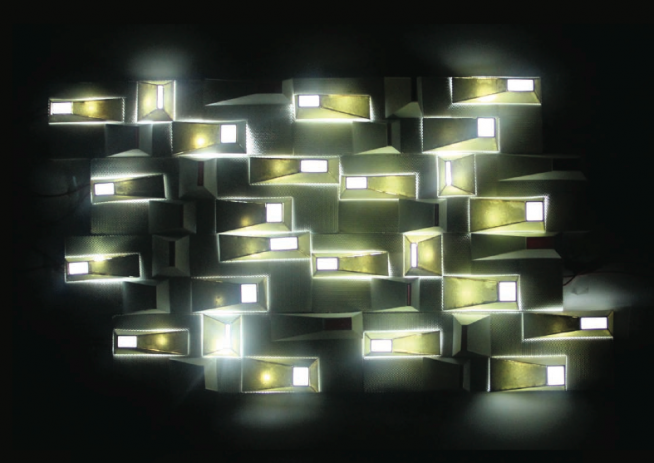

iLounge
Public social space is all around us and permanently changing. iLounge/instant/interim/interactive provides a social stage to create a temporary community for a minute, an hour, or an evening. Operating as a social catalyst, it will be what the citizens of Minneapolis want it to be; the visitor to iLounge is an active part of its spatial production. The ambition of iLounge is to be an urban space that interacts with its inhabitants, adapting to the needs of the citizens but also stimulating them to look, listen, exchange, reflect, relax, and gain something lasting from the experience. iLounge is instant, interim, and interactive, and predominately refers to “I” am.
The design suggests a dynamic and adaptive carpet, a topography that embraces and stimulates exchange as well as interaction. The configuration is intended to alter the speed and the direction of its participants, influencing them to interact, slow down, look in various directions, and generate informal exchanges to promote different types of urban life. The architectural modules have a versatile surface that supports the human body in multiple ways: lounging, standing, resting, socializing, exchanging, playing, observing, and being observed. As an interactive piece, the modular nature of iLounge offers the option to change the topography of its surface, to aggregate and rearrange its layout.
This inhabitable social sculpture motivates the creation of a temporary community in flux. Live-feed video cameras create a media echo of the spatial production. The media footage feeds into an incorporated projection station that will project the image of the interim social space onto surrounding urban surfaces and firewalls. The visitors are not passive spectators but dynamic participants in the production of art. Real-time mapping of iPhone locations will be displayed in the media footage. iLounge is public furniture, but even more it is an interactive artifact of cultural production. QR codes spread throughout the city communicate the space far beyond its spatial dimensions, encouraging the creation of interim communities in material and digital space. Visitors are invited to reflect on the concept of social space in flux and might better understand the importance of social networks in our everyday culture.
iLounge is a co-commission of Northern Spark and ZERO1 to be presented at Northern Spark 2012 in Minneapolis, MN, and the 2012 ZERO1 Biennial in San Jose, CA and is supported in part by the National Endowment for the Arts.
Mona El Khafif
Mona El Khafif is associate professor of architecture and head of the URBANlab at California College of the Arts. She received a professional architecture degree in Germany and a doctorate in urban design in Austria. After practicing and teaching at the TU Vienna, she joined the URBANbuild program at Tulane University in the aftermath of Hurricane Katrina. She coauthored URBANbuild: Local/Global and published Staged Urbanism: Urban Spaces for Art, Culture, and Consumption in the Age of Leisure Society. Her design research operates at multiple scales, examining interdisciplinary aspects of urban regeneration and the production of public spaces. At the ZERO1 Biennial in 2010, with a group of URBANlab students, she presented OPspace, an interactive installation designed to reactivate empty storefronts.
http://ulab.cca.edu/2010/03/public-gallery-project-space-kunsthall-vienna/
http://ulab.cca.edu/2010/01/10×10-cities/
http://ulab.cca.edu/2011/06/opspace/
Marcella del Signore
Marcella Del Signore is assistant professor at Tulane School of Architecture. She holds a master’s degree in architecture from University La Sapienza in Rome and an MS in advanced architectural design from Columbia University. She is the principal of X-Topia, a practice networked in the United States and Europe that explores the intersections of design with digital processes, urban space, and art. Her research focuses on the understanding and development of public and urban space through performative actions, applied technology, responsive systems, and digital processes. She has practiced in Rome, Madrid, New Orleans, and New York. In 2010 she was awarded “Young Italian Talent” by the Italian government in the architecture and design category.
http://issuu.com/marcelladelsignore/docs/mds




